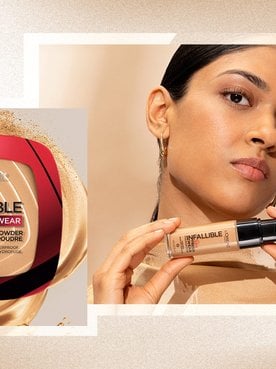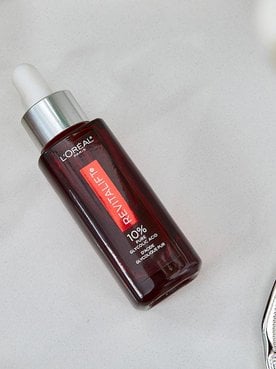In this article
If you struggle with oily skin, you may notice large pores, frequent breakouts, or makeup sliding off by midday. This oil, called sebum, can be frustrating, but it’s not all bad—it helps keep your skin safe and moisturized. Oily skin, also known as seborrhea, happens when the sebaceous glands produce more oil than your skin needs. The challenge is learning how to manage this excessive oil production without overdrying your skin.
The good news is that once you understand what causes an oily face, you can create a routine that keeps excess shine in check. Keep reading to learn what causes oily skin, tips to reduce excess oil, and what standout skincare products you can use to help balance oily skin.
What Causes Oily Skin?
If you’ve ever wondered, “Why is my face so oily?,” know that there are several factors that can cause your skin to look shiny, ranging from genetics to lifestyle habits. Oil production also varies throughout your life—you may notice more oiliness during certain life stages, climates, or even times of the year.
Here are the main causes of oily skin to help you identify the culprit:
Age
Oily skin usually shows up the most during your teen years and early twenties, when oil glands are working overtime. As the years go by, oil production tends to slow down, which is why mature skin often feels a bit drier. Still, changes like pregnancy, menopause, or even periods of stress can make that extra shine return.
Genetics
Some people are simply born with bigger and more active oil glands, which makes them more likely to have oily skin. You can’t change your genetics, but you can work with your skin by choosing the right products and habits. With a consistent routine, it’s possible to control shine, keep pores clearer, and make oily skin feel a lot more manageable.
Environmental conditions
Your surroundings can play a big role in how your skin looks and feels if you have an oily face. Hot, humid days often lead to more shine and clogged pores because your skin is producing oil on top of sweat. In contrast, cold, dry winters can pull away too much moisture, which may cause your skin to feel tight at first, but then signal your oil glands to produce even more sebum to compensate.
Stress
When you’re stressed, your body releases certain hormones, like cortisol, that can tell your skin to make more oil. This extra oil often shows up on your forehead, nose, and chin. So if you tend to get oily skin and breakouts during busy weeks, stress may be part of the reason.
Hormones
Hormonal changes have a big impact on oily skin. During puberty, monthly cycles, pregnancy, and menopause, hormone levels shift in ways that can push your oil glands to work harder. As we mentioned, even the hormone spikes that come with stress can add to the shine and make breakouts more likely.
Skipping moisturizer
It may feel counterintuitive, but skipping moisturizer can make oily skin even worse. According to the American Academy of Dermatology (AAD), when skin lacks hydration, oil glands produce more sebum to make up for it. Use a lightweight, water-based moisturizer, such as theL’Oréal Paris RevitaLift Derm Intensives Micro Hyaluronic Acid + Ceramides Line-Plumping Water Cream, to hydrate your skin without leaving it feeling greasy or weighed down.
Under-cleansing
If you don’t wash your face enough, oil, sweat, and dirt can build up and block your pores, causing breakouts. That’s why the AAD recommends washing oily skin twice a day—once in the morning and once at night—and also after exercise or heavy sweating. This simple routine helps keep your skin fresh and your pores clean.
Over-cleansing
On the flip side, cleansing too often or using harsh cleansers can strip away your skin’s natural balance and push your oil glands to work overtime. That’s why it helps to stick with a gentle formula, like theL’Oréal Paris RevitaLift Radiant Smoothing Cream Cleanser, which carefully washes away dirt, makeup, and excess oil without drying out your skin.
Water temperature
Using very hot water when washing your face can strip away the natural oils that protect your skin, leaving it dry and tight. When this happens, your oil glands may try to overcompensate by producing even more sebum. To keep your skin comfortable and balanced, it’s best to use lukewarm water whenever you cleanse.
Lifestyle factors
Some research suggests that eating a lot of processed foods and sugary snacks can make your skin produce extra oil. To support healthy-looking skin, it’s best to stick with a balanced diet rich in whole foods, such as fruits, vegetables, and whole grains.
Shop the Products
How To Control Oily Skin
You can’t totally “get rid” of oily skin, but you can reduce excess sebum and keep shine under control with the right routine and habits. Here are some easy, dermatologist‑informed tips and product suggestions to help oily skin look—and, more importantly, feel— its best.
Wash your face twice a day (and after sweaty workouts)
Wash your face with a gentle cleanser every morning and evening to remove oil, dirt, and makeup. Avoid scrubbing too harshly, as this can irritate your skin and increase oil production. TheL’Oréal Paris RevitaLift Radiant Smoothing Cream Cleanser is a great choice for daily use. It’s formulated to nourish skin and boost radiance while gently exfoliating and removing all traces of impurities and makeup.
Choose products that are formulated for oily skin
If you’re figuring out how to get rid of oily skin, look for skincare with ingredients like salicylic acid, niacinamide, and hyaluronic acid, which are especially helpful for oily and breakout-prone skin. A great example is theL’Oréal Paris RevitaLift 12% Pure Vitamin C + E + Salicylic Acid Serum, which has a lightweight, fast-absorbing texture that helps minimize the look of pores, smooth skin texture, and boost radiance without leaving behind a greasy feel.
If you’re dealing with dark spots or post-blemish marks (a common concern for those with oily, blemish-prone complexions), try theL’Oréal Paris Bright Reveal 12% Niacinamide + Amino Sulfonic + Ferulic Acid Dark Spot Serum. The lightweight formula helps fade discoloration, even skin tone, and leaves skin feeling fresh with a non-sticky finish.

Shop the Products
Hydrate your skin
Even oily skin needs hydration. Lightweight, oil-free moisturizers and hydrating serums can keep your skin from producing excess oil. One of our favorites for all skin types is the L’Oréal Paris Bright Reveal Vitamin C Glow Moisturizer. The non-comedogenic formula delivers up to 72 hours of lightweight hydration and helps brighten the skin for a more even, radiant complexion over time.

Give blotting papers a try
Blotting papers are a quick and easy way to soak up extra oil when you’re on the go. Just press a sheet onto shiny spots like your forehead, nose, or chin to absorb excess sebum on an oily face without messing up your makeup. They’re small enough to keep in your bag, so you can freshen up anytime during the day and keep your skin looking balanced while you learn how to control oily skin.
Wear sunscreen every day
Sun protection is essential for all skin types, especially if you’re trying to keep oily skin balanced and healthy. Always choose a non-comedogenic sunscreen that won’t clog pores or add to shine. You can try theL'Oréal Paris RevitaLift Triple Power Moisturizer with SPF 30, which combines broad-spectrum sun protection with anti-aging benefits, moisturizing, firming, and smoothing skin for a more even-toned, radiant look.

Avoid touching your face throughout the day
Touching your face moves oil, dirt, and bacteria from your hands onto your skin, which can make breakouts worse and add even more shine. Keeping your hands away from your face is key to avoid an oily face and help reduce clogged pores. This simple habit makes a big difference in how to reduce oily skin and keeping your complexion looking fresh and clear.
Consider exfoliation
Gentle exfoliation helps unclog pores, smooth rough patches, and cut down on oil buildup. Look for products with salicylic acid or glycolic acid—these ingredients work to keep pores clear and brighten the skin without being too harsh. If you’re on the hunt for something you can use daily, try theL'Oréal Paris RevitaLift 10% Pure Glycolic Acid Serum, which gently resurfaces the skin, softening fine lines and reducing dullness for a fresher look. For more intense exfoliation and skin-brightening benefits, we love the L’Oréal Paris Bright Reveal Dark Spot Exfoliant Peel. It contains AHAs, BHAs, and PHAs, and gently exfoliates the skin to reveal a smoother, more even complexion in a single use. For the best results, we recommend using it no more than four times per week (at night). Always remember to follow up with broad-spectrum sunscreen the next day, as chemical exfoliants can make your skin more sensitive to the sun’s damaging rays.

Eat a healthy, balanced diet
A balanced diet rich in whole foods supports overall skin health and can help your complexion look clearer. Cut back on processed foods and sugary snacks to help control your oily face over time. Fill your meals with fruits, vegetables, whole grains, lean proteins, and healthy fats to support your skin from the inside out.
Manage stress levels
Since stress can trigger excess oil production, finding ways to relax is really important for your skin. Try simple activities like yoga, meditation, journaling, or even a short daily walk to calm your mind and help bring oil levels back into balance. Building these habits into your routine supports your overall well‑being and makes it easier to manage oily skin day to day.
Shop the Products
Oily Skin FAQs
Does drinking water reduce face oiliness?
Staying hydrated supports your skin barrier, but drinking water doesn’t directly control sebum production. That said, well-hydrated skin often looks healthier and feels more balanced overall.
What deficiency causes oily skin?
There’s no scientific evidence that a specific vitamin or mineral deficiency directly causes oily skin. Oil production is primarily linked to genetics, hormones, and lifestyle factors.
Why is my face so oily all of a sudden?
Sudden changes in oiliness can be linked to hormonal shifts, stress, or even adjustments in your skincare routine. If the issue persists, consult a dermatologist to pinpoint the cause and tailor your skincare plan.
Next Up:How To Get Clear Skin: 12 Tips for a Clearer Complexion
Photo courtesy of L’Oréal Paris







